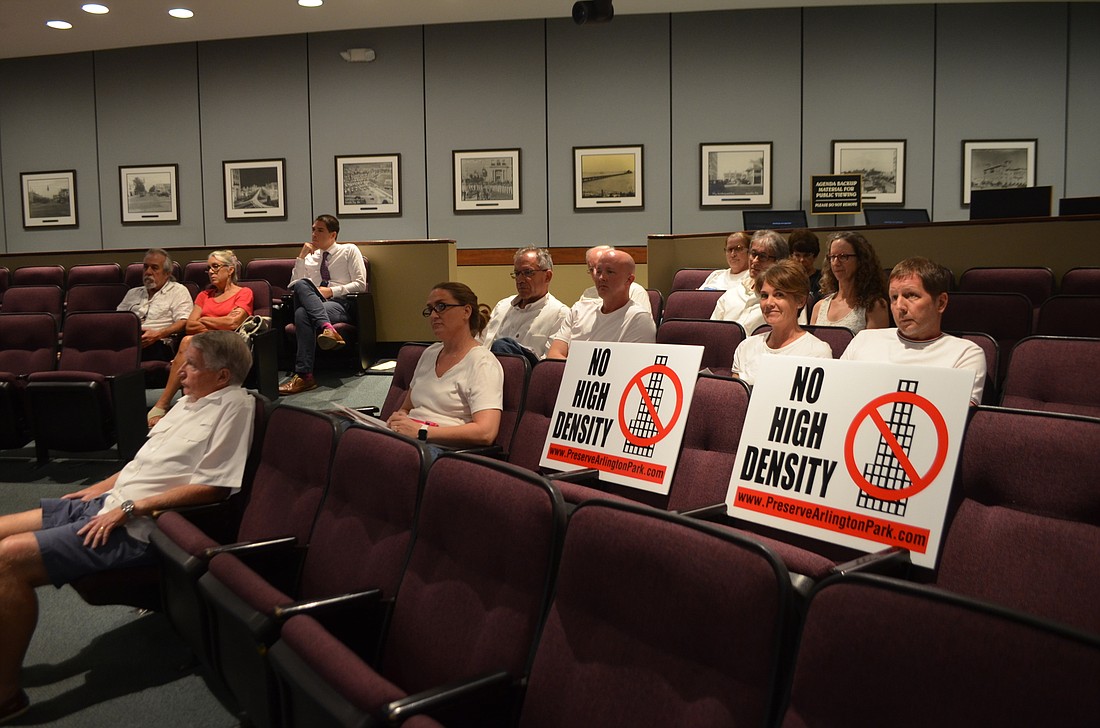- February 21, 2025
-
-
Loading

Loading

Mary Anne Bowie thinks residents in Arlington Park are open to change — as long as it’s well-planned out.
Bowie is president of the Arlington Park Neighborhood Association. At a September meeting, the group passed a resolution asking the city not to increase the permitted residential density for properties in and around Arlington Park until a new action plan for the neighborhood is created.
The resolution is a response to two development proposals that have drawn opposition from Arlington Park residents. A project called Arlington Commons calls for the addition of 233 apartments on a 4.67-acre site on Bahia Vista Street near Tuttle Avenue. And, at the direction of the City Commission, city staff has prepared a zoning text amendment that would allow residential construction of up to 25 units per acre on the Midtown Plaza property at U.S. 41 and Bahia Vista.
Hundreds of Arlington Park residents have signed a petition opposing the Arlington Commons project. More than 20 appeared at a City Commission meeting to speak out against the Midtown Plaza zoning change, successfully lobbying the city to require the property owner to meet with residents before the commission considers adopting the new land use regulations. Yard signs throughout the neighborhood read “No high density,” an attempt to send a message to the city the proposals are unpopular with homeowners in Arlington Park.
Bowie thinks the proposals have drawn so much attention in the neighborhood because residents fear there’s a lack of long-term planning behind the potential changes. She also thinks there’s an issue with concentrating new residents on specific sites within the neighborhood after a property owner requests a zoning change allowing higher density.
She suggested neighbors would be more open to changes that integrate different housing types on a smaller scale into the predominantly single-family neighborhood, such as the allowance of accessory dwelling units.
“Let’s not just slam new high density, that hasn’t even been — and will not be — considered in the transportation plan [the city is currently producing], and instead use some creativity here,” Bowie said.
City Planning Director Steve Cover said the decision of whether to proceed with a neighborhood planning effort in Arlington Park would be up to the City Commission. When officials abandoned their pursuit of a new citywide form-based zoning code earlier this year, planning staff members said they would not be focusing on making any changes to the regulations in single-family neighborhoods.
Cover said he would need to see a clear indication the entire community was interested in undertaking a planning initiative in Arlington Park, adding that the planning department already has a long to-do list.
“We have so many initiatives in the pipelines right now with all these ordinances and projects, I’m not certain when we could start on it,” Cover said.
Arlington Park’s opposition to the proposed zoning changes in and around the neighborhood has drawn criticism from some city officials. City Commissioner Hagen Brody took issue with the notion that higher density was inherently a bad thing, stating it is helpful for the production of more affordable housing. The Arlington Commons project would include 35 attainable units, and the City Commission directed staff to include a requirement for attainable housing if the zoning on the Midtown Plaza property is changed.
Cover said the city is working on long-term planning initiatives, but he said staff was required to process requested changes as they’re submitted. The Arlington Commons proposal was a privately initiated request that is now going through the city’s development review process, and the City Commission itself initiated the Midtown Plaza zoning change.
In September, Brody suggested the city couldn’t go through a lengthy community engagement process every time officials considered making changes to zoning regulations, but Bowie was optimistic a neighborhood planning effort could be done in a year.
“Ours wouldn’t be that difficult if you just did a nice, basic, standard plan,” Bowie said. “We’re not talking about some consultant being necessary. This is what planners learn how to do in planning school.”
And although the proposal emanated from Arlington Park, Bowie hoped the concept could be used to craft neighborhood-specific plans throughout the city.
“We’re not asking for this planning process for Arlington Park only,” Bowie said. “We’re asking for it for everybody.”